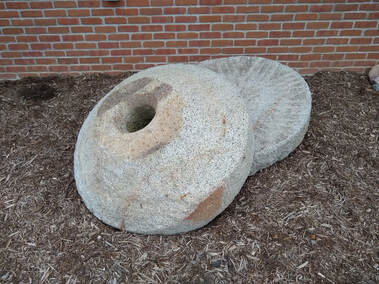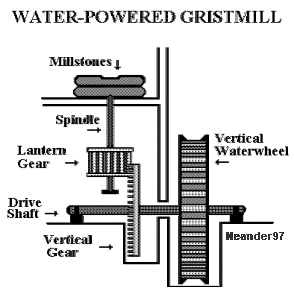Wolf Creek Grist Mill Stones

Wolf Creek Mill, also known as Constant’s Mill, was located on Wolf Creek about three and half miles southeast of Williamsville.
Thomas Constant bought the land in 1824 and built the mill a year later. The Mill was unique because it could grind two substances at once.
Constant sold the Mill to Robinson/Pickrell/Beck for $900 in 1837. They sold the Mill in 1842 to Thomas Lewis for the Mill to help support the Simpson’s 14 children who became orphans when their parents died of typhoid. In 1849, George Fisher bought the Mill for $700. He operated it for 10 years and then sold it to John, James, David and Williams Johnston for $500.
It is believed that the Mill was torn down in 1874.
According to the 1881 History of Sangamon County, “All that now remains of the mill are the stones, which yet lie upon the banks of the stream.”
These stone are from the Wolf Creek Mill but they were replacement stones and were never used in the Mill.
Thomas Constant bought the land in 1824 and built the mill a year later. The Mill was unique because it could grind two substances at once.
Constant sold the Mill to Robinson/Pickrell/Beck for $900 in 1837. They sold the Mill in 1842 to Thomas Lewis for the Mill to help support the Simpson’s 14 children who became orphans when their parents died of typhoid. In 1849, George Fisher bought the Mill for $700. He operated it for 10 years and then sold it to John, James, David and Williams Johnston for $500.
It is believed that the Mill was torn down in 1874.
According to the 1881 History of Sangamon County, “All that now remains of the mill are the stones, which yet lie upon the banks of the stream.”
These stone are from the Wolf Creek Mill but they were replacement stones and were never used in the Mill.

Grist Mill works when one stone is stationary
and one stone is spinning. Anything between
the two stones is then grounded. For example
wheat would be grounded into flour.
